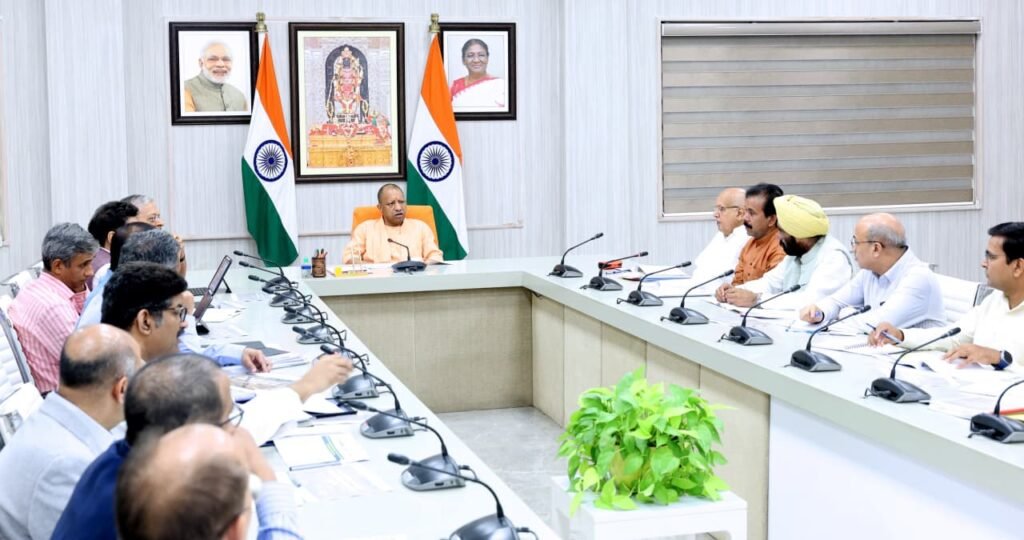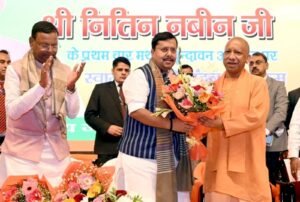Digital Agriculture: UP to frame Digital Agriculture Policy; farmers to get real-time data on crops and markets: CM Yogi

Digital Agriculture:
Rs 4000 crore UP- Agrees project underway in 28 districts to increase farmers’ income from seed to market
CM stresses value addition and processing to boost local jobs from farm to factory
UP to develop ideal agricultural models in every district under DASP: CM Yogi
Clusters to be developed for red chillies in Banaras, peanuts in Bundelkhand, and banana from Barabanki to Azamgarh
UP sets target for fish seed production and 90,000 hectares development in fisheries sector
Chief Minister directs appointment of sectoral experts for effective implementation of UP- Agrees project
Instructions issued to strengthen agricultural financial system, providing credit facilities to small and marginal farmers, and attract private investment
Digital Agriculture
Lucknow, October 14: Chief Minister Yogi Adityanath has directed officials to expedite the creation of a Digital Agriculture Ecosystem in Uttar Pradesh to strengthen the agricultural sector through self-reliance, sustainability, and digital innovation. The proposed system will provide real-time, integrated access to data on crops, weather, seeds, irrigation, fertilizers, insurance, markets, logistics, and institutional services.
Reviewing the progress of the Uttar Pradesh Agriculture Growth and Rural Enterprise Ecosystem Strengthening Project (UP-Agrees), the Chief Minister instructed that a Digital Agriculture Policy be prepared based on national technical standards to ensure secure cyber infrastructure and promote innovation-based research.
Highlighting the vision of “From Agriculture to Industry”, the Chief Minister emphasized value addition, processing, and local employment generation. He directed that under the coordination of the Uttar Pradesh Diversified Agriculture Support Project (UP DASP), the initiative be implemented in collaboration with agricultural universities, Krishi Vigyan Kendras, and Farmer Producer Organizations (FPOs).
Officials informed that the Rs 4,000-crore (US$500 million) project, supported by the World Bank, is being implemented over six years across 28 districts in eastern Uttar Pradesh and Bundelkhand. The project aims to promote sustainable growth aligned with changing climatic conditions, strengthen market linkages, enhance productivity, optimize resource use, and support the development of agro-based industries.
The Chief Minister was informed that under the productivity enhancement program, emphasis is being laid on land development, water conservation, soil health improvement, and adoption of modern technology-based agricultural practices. Collective efforts are being made to connect small and marginal farmers with technical support, training, and marketing facilities. The chief minister said that planned efforts should be made to ensure the availability of improved seeds.
It was also informed that under the Commodity Cluster Approach, clusters are being developed for peanuts in Bundelkhand, red chili and vegetables in Varanasi, for banana between Barabanki and Azamgarh, and for crops like Kala Namak rice, green peas, black gram (urad), and potatoes. The Chief Minister directed that ’tissue culture’ should be promoted to boost banana cultivation. He also emphasized appointing sectoral experts for the effective implementation of the project.
Discussing the fisheries sector, the Chief Minister emphasized the need to produce fish seed within Uttar Pradesh to cut costs for fish farmers. Officials informed the CM that under the cluster development approach, comprehensive measures are being implemented to boost fish production and productivity, ensure quality seed supply, adopt modern technologies, and strengthen management from production to marketing. The project targets the development of around 90,000 hectares for fish farming, benefiting nearly one lakh families.
The Chief Minister said that strengthening the agricultural financial system is extremely important. Under this, emphasis should be placed on providing credit facilities to small and marginal farmers, as well as to micro and small enterprises based on agriculture, establishing strong risk management systems, and encouraging private investment.
Officials informed in the meeting that significant progress has been made in the institutional groundwork for the project. Social and environmental assessments have been completed, and both the monitoring, learning, and evaluation agency and the technical support agency have been appointed. A six-year productivity program agreement has also been finalized with the International Rice Research Institute (IRRI). The process of selecting a technical support agency for capacity building of Farmer Producer Organizations (FPOs) is nearing completion, while the appointment of a technical advisory agency is in its final stage.
The Chief Minister said that the objective of this project is not only to increase agricultural production but also to make the rural economy self-reliant. He directed that the results of each component of the project be reviewed regularly and that it be ensured the direct benefits reach the farmers. The Chief Minister also instructed to make necessary arrangements for continuous monitoring of the UP-Agrees project.




